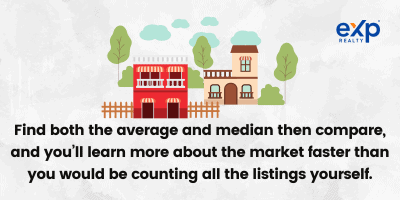The terms ‘average’ and ‘median’ get thrown around a lot whenever money is involved in the real estate industry. They’re both very useful tools that absolutely must be understood to get a grip on any real estate market. If you’re looking for a property in a diverse market like Los Angeles real estate, and you’re unsure of whether to use the average vs. median home price, we’re going to lay out the difference between the two and the best way to use them both.
Why Use Average Vs. Median Home Price At All?

We use averages and medians for a reason: they give us a useful generalization about the prices in any given market at any given time. If you had the time and inclination you could pull up a city’s listings and slog through all of them to get an idea of what prices to expect, but that could take hours. Instead, you could find the median or the average of those prices, which would give you the same understanding in a fraction of the time.
In short, we use medians and averages to help us make generalized comparisons about prices within one market, as well as prices between several markets. With that said, let’s dive a little deeper into this average vs. median home price debate.
What Exactly Is The Average?
The average is a hypothetical number meant to be the best singular representative of a set of numbers. You find an average by adding up all the numbers in a set, then dividing that sum by the amount of numbers in the set. Let’s try an example.
1 2 3 4 5
Add those numbers up, then divide by 5. You get 3.
3 seems to be a good average for that set, doesn’t it? It’s right in the middle.
Let’s try that again, but with a different set of numbers. Let’s use hypothetical home prices instead.

The Issue With Averages
But wait, over half the prices in that list are under $300K, yet the average is $512K? Only one price on that list is even remotely close to $512K.
That is the fundamental problem with averages, especially when comparing median home prices. They aren’t so useful when there are radical differences in the values of each number in the set, or big jumps between numbers, such as the jump between 400 and 899, and 899 and 1.5.
But when comparing listings in a city, and even in some neighborhoods, you will find several listings priced much higher (and much lower) than the majority of the listings in that city. If you try to use the average home price in such a case, you won’t be getting a good idea of the distribution of the prices in that city or area. That’s why we use medians.
What Exactly Is The Median?
The median is the middlemost number in a set of numbers. In a given area’s real estate, this means that half of all homes sell below the median price, and half of all homes sell above the median price. The median home price is like the 50-yard line of real estate.
Let’s have another example; we will take the hypothetical home prices from before. We’ll add another number to make the list odd, just for convenience’s sake.

Instead of adding up all those numbers, find the middlemost number. Before us we have a list of 9. The 5th house price in that list is the median, because it has four prices below it, and four above it. The median is $289K. Even with that extra $3M tacked on at the end, the median still represents what you’ll mostly find in that set of hypothetical home prices. Medians mitigate the influence that outlying prices on the high end and low end of a housing market have on averages. In that same number set, the average would be $789K.
If You Had To Choose Between The Two? Average Vs. Median Home Price
In almost every case you’ll get a better answer by taking the median of a set of home prices, not the average. The median is almost always more representative of the distribution of the data. It will show you where prices are clustered, whereas the average will show you where the prices ought to be clustered. However, that’s not to say that averages don’t have their uses.
When To Use The Average
Averages are very useful when looking at a data set (such as a listing page for a particular neighborhood) in which all values are relatively close together, and the numbers in the set increase gradually from one number to the next.
For example, if you’re looking at neighborhoods where all the homes sell between $800K and $900K, and there are no radical outliers that are more or less expensive than that range, the average will suit you fine.
When you’re at the very end of your home search, and you’ve narrowed yourself down to the neighborhood level like that, consider using the average instead of the median, to generalize about the prices of those neighborhoods.
When To Use The Median
Use the median anytime there are big jumps in price in a given neighborhood. It’s relatively rare to find neighborhoods that don’t feature a few homes for, say, $300K, and a few homes for $700K or even higher. In cities, you can typically find homes for less than $200K and more than $2M, making the median an even more viable option over the average.
Medians are useful in very diverse areas pricewise, all the way from the neighborhood to the state level. When comparing several neighborhoods or whole cities like the 5 best suburbs of Dallas, you’ll want to compare the median prices of those cities to account for a luxury property that might be driving the average prices up higher than what is actually useful to know.
Average VS. Median Home Price. Why not both?
 The average and the median are great tools on their own and when brought together. Rather than take the median instead of the average, or vice versa, find both and compare, and you’ll learn more about the market faster than you would be counting all the listings yourself.
The average and the median are great tools on their own and when brought together. Rather than take the median instead of the average, or vice versa, find both and compare, and you’ll learn more about the market faster than you would be counting all the listings yourself.
For example, if the average house price in a given area is significantly higher than the median, that means there are at least a few high-valued properties in that area. Conversely, if the average is much lower than the median, there are at least a few extremely affordable homes that you should take into consideration. Measuring that discrepancy between the average and the median can tell you a lot about a market and what kind of property distribution you can expect.
Average Vs. Median Home Price: Learn The Difference
The one word of warning we’ll give is that the average and the median are only as good as their data. To get the most accurate averages and medians, you want as much data as possible to draw from. The more listings you can use to find the median listing price or the average listing price, the better. With fewer listings, you’ll get less reliable results. The good news is, when it comes to real estate, if you’re only working with a few listings, you probably don’t need to know the average or the median to make the right choice on a house and get in touch with a real estate agent.





